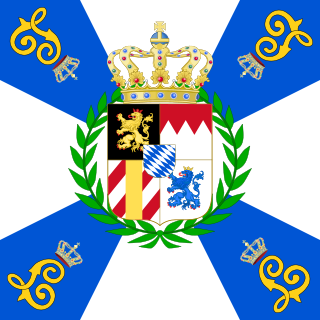
Zweibrücken is a town in Rhineland-Palatinate, Germany, on the Schwarzbach river.

Maximilian I Joseph was Duke of Zweibrücken from 1795 to 1799, prince-elector of Bavaria from 1799 to 1806, then King of Bavaria from 1806 to 1825. He was a member of the House of Palatinate-Birkenfeld-Zweibrücken, a branch of the House of Wittelsbach.

The Electorate of Bavaria was a quasi-independent hereditary electorate of the Holy Roman Empire from 1623 to 1806, when it was succeeded by the Kingdom of Bavaria.
The Battle of La Roche-l'Abeille occurred on 25 June 1569 between the Catholic forces of King Charles IX of France commanded by the Duke d’Anjou and the Huguenots commanded by the Admiral de Coligny during the "Third War" (1568–1570) of the French Wars of Religion.

Christian IV, Count Palatine of Zweibrücken-Birkenfeld was Duke of Zweibrücken from 1735 to 1775.

Wiesbach is a municipality in Südwestpfalz district, in Rhineland-Palatinate, in the southwest of Germany. The place name is composed of the two German words for meadow and brook.

Karlsberg Castle is a castle ruin on Buchenberg east of Homburg in Saarland, Germany. The castle was constructed from 1778 to 1788 in Baroque and Classical style by Johann Christian von Mannlich, architect and general building director of the dukes of Zweibrücken, by order of Charles II August, Duke of Zweibrücken. The castle was the largest country palace of Europe and served as the residence of the Duke of Zweibrücken. In 1793 the castle was destroyed by French revolutionary troops.

Prince Adalbert of Bavaria was a member of the Bavarian Royal House of Wittelsbach, historian, author and a German Ambassador to Spain.

The Bavarian Army was the army of the Electorate (1682–1806) and then Kingdom (1806–1918) of Bavaria. It existed from 1682 as the standing army of Bavaria until the merger of the military sovereignty of Bavaria into that of the German State in 1919. The Bavarian Army was never comparable to the armies of the Great Powers of the 19th century, but it did provide the Wittelsbach dynasty with sufficient scope of action, in the context of effective alliance politics, to transform Bavaria from a territorially-disjointed small state to the second-largest state of the German Empire after Prussia.
Christian von Zweibrücken may refer to:
Christian Grafvon Forbach, then Christian Marquis de Deux-Ponts and later Christian Freiherrvon Zweibrücken was an officer of the French Army and later a general of the Royal Prussian and then of the Bavarian Army, at last in the rank of General der Infanterie. He should not be confused with his nephew Christian Freiherr von Zweibrücken, who was a Bavarian General of Cavalry.
Forbach is a commune in the Moselle department in Lorraine in northeastern France.

Philippe Guillaume aka Philipp Wilhelm Grafvon Forbach, then Vicomte de Deux-Ponts and later Freiherrvon Zweibrücken (1754–1807) was an officer of the French and later general of the Bavarian Army.

Bernhard Erasmus von Deroy from the Electorate of the Palatinate became a noted general officer in the army of Bavaria. His military career began shortly after the start of the Seven Years' War. During the French Revolutionary Wars he first served on the side of the Coalition against the French revolutionaries, then fought as an ally of the First French Empire during the Napoleonic Wars. Deroy and his colleague, Karl Philipp von Wrede, were dominant personalities in the Bavarian military during the era of Napoleon Bonaparte.
Brigadier-General Charles Auguste Creutzer was a French officer in Napoleon's Army.

Friedrich Johann Daniel Alois, Freiherr von Zoller was a Bavarian lieutenant-general who fought in the Napoleonic Wars.

The Hôtel des Deux-Ponts, formerly known as the Hôtel Gayot and currently as the Hôtel du gouverneur militaire, is a historic building located on Place Broglie on the Grande Île in the city center of Strasbourg, in the French department of the Bas-Rhin. It has been classified as a Monument historique since 1921.
Heinrich Julius Alexander von Kalb or Henry Jules Alexandre de Kalb was a German-born officer in the French Army.

The Royal Deux-Ponts Regiment was a line infantry regiment of the French Royal Army raised in the Palatine Zweibrücken which existed from 1757 to 1791. They are an example of the policy of Soldatenhandel.

Georges-Louis-Félix, baron de Wimpffen or Wimpfen was a French general of the Revolutionary and Napoleonic Wars.
This page is based on this
Wikipedia article Text is available under the
CC BY-SA 4.0 license; additional terms may apply.
Images, videos and audio are available under their respective licenses.













